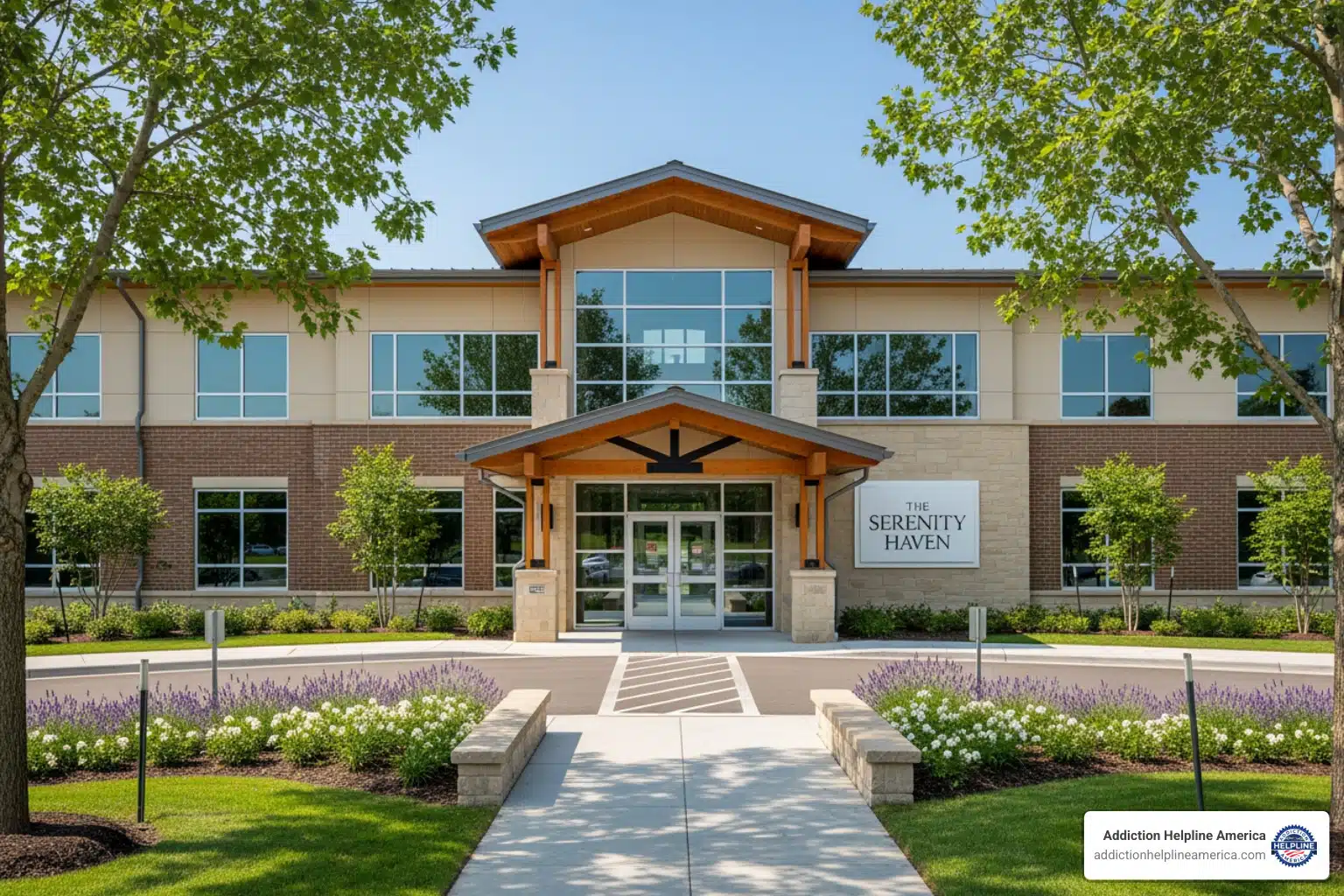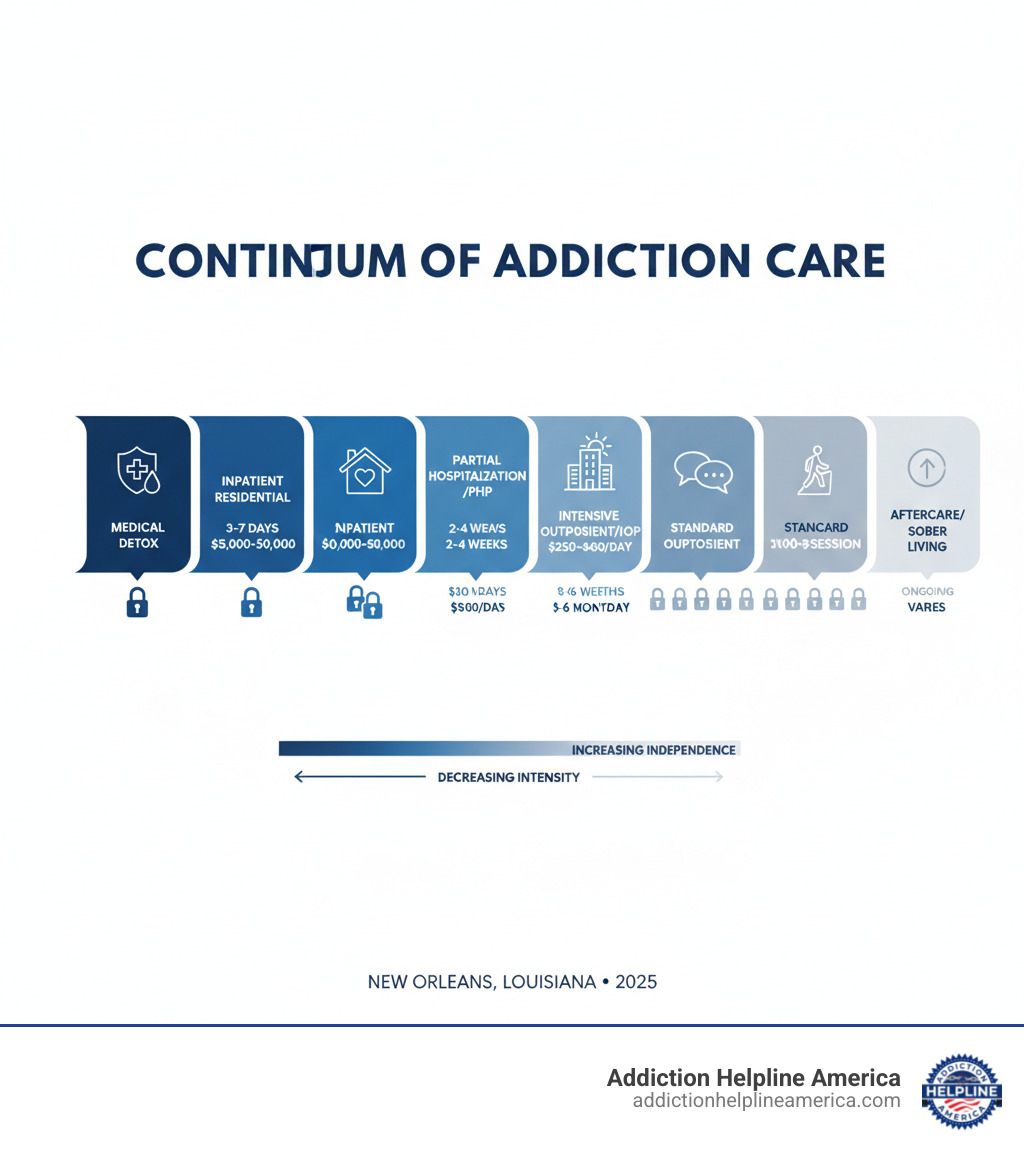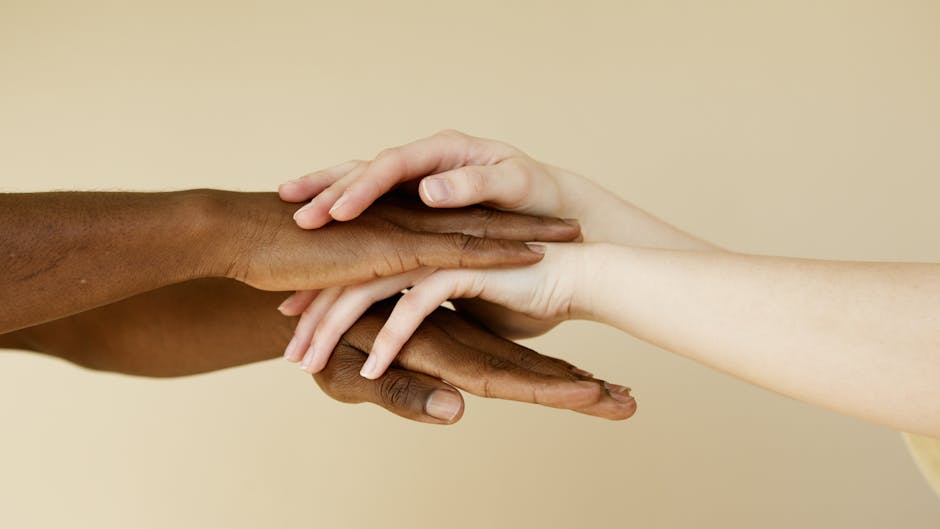
Understanding Your Options for Affordable Addiction Treatment in New Orleans
Rehab centers in new orleans louisiana offer a range of treatment options from medical detox to outpatient care, with costs ranging from $1,000 to $50,000 depending on the program type and duration. The good news: financial help is available through insurance coverage, state-funded programs, and even free residential treatment options for those who qualify.
Quick Overview of New Orleans Rehab Options:
| Treatment Type | Cost Range | Payment Options Available |
|---|---|---|
| Outpatient Programs | $1,000 – $10,000+ | Insurance, Medicaid, Sliding Scale |
| Inpatient/Residential | $5,000 – $50,000 | Insurance, State Funding, Free Options |
| Medical Detox | Varies | Medicare, Medicaid, Private Insurance |
| Intensive Outpatient (IOP) | $3,000 – $10,000 | Most Insurance Plans, Payment Plans |
If you or a loved one is struggling with addiction in New Orleans, you’re not alone. The city has 15 dedicated alcohol and drug rehab centers, many offering financial aid like state-funded programs, scholarships, grants, and payment plans to ensure cost isn’t a barrier to recovery.
While financial barriers are real, they are not impossible. Priority for free or low-cost treatment is often given to disadvantaged populations, Medicare recipients, and pregnant women. Most facilities also accept major insurance providers like Blue Cross Blue Shield, Cigna, and Aetna, which can significantly lower your costs.
At Addiction Helpline America, we help individuals and families find affordable, quality treatment. We understand that cost is a major concern, and our team provides free, confidential guidance to help you steer your options.
This guide breaks down how to find budget-friendly rehab in New Orleans, covering costs, insurance, state-funded programs, and free options. You’ll find practical information to start your recovery journey.
Must-know rehab centers in new orleans louisiana terms:
Understanding the Cost of Rehab in New Orleans
When seeking help for a substance use disorder, cost is a major concern. While expenses for rehab centers in new orleans louisiana vary widely, affordable options are always available. This section breaks down the typical costs of addiction treatment in New Orleans and the factors that influence the price.
Average Cost of Treatment Programs
The cost of rehab in New Orleans varies. While research shows the average cost is around $59,468, this figure covers the full spectrum of care. Your actual expenses will depend on the program you choose.
- Outpatient rehab costs typically range from $1,000 to $10,000 or more, depending on the program’s intensity and duration.
- Inpatient rehab costs range from $5,000 to $50,000, reflecting the immersive, 24/7 care these programs provide.
The final price depends on the level of care, program intensity, and length of stay. While a 30-day program is cheaper than a 90-day one, longer stays often improve long-term outcomes.
Factors That Influence the Price of Rehab
Several specific factors impact what you’ll pay for drug rehab in New Orleans:
- Location: Centers in prime or therapeutic settings may have higher costs. New Orleans ranks as the 80th most expensive city nationwide for treatment affordability, but prices vary within the metro area.
- Amenities: Luxury facilities with private rooms, gourmet meals, or spa services cost more than basic centers. While these extras improve comfort, they aren’t essential for effective recovery.
- Private vs. Public Facilities: Private centers generally cost more, offering personalized care and smaller staff-to-patient ratios. Public or state-funded facilities prioritize affordability and accessibility.
- Level of Care: Costs are directly tied to the intensity of care. Medical detox and inpatient programs are the most expensive due to 24/7 supervision. Partial Hospitalization Programs (PHP), Intensive Outpatient Programs (IOP), and standard outpatient care are progressively more affordable.
- Program Duration: Longer stays (60 or 90 days) have a higher total cost than short-term programs (30 days). However, longer programs often lead to better outcomes and a lower chance of relapse.
- Staff-to-Patient Ratio: A lower staff-to-patient ratio allows for more individualized attention but typically increases the cost. This personalized care can significantly improve the treatment experience.
Understanding these factors helps you choose a program that fits your recovery needs and budget. For more information on options available across the state, you can explore Louisiana rehab options.
How to Pay for Rehab: Insurance, State-Funding, and Free Options
Financial limitations should not prevent you from getting life-saving addiction treatment. New Orleans offers many ways to make rehab affordable. This section explores how to pay for care so that cost is not a barrier.
Using Health Insurance to Cover Costs
Health insurance is a powerful tool for reducing rehab costs. Thanks to the Mental Health Parity and Addiction Equity Act, most plans cover substance use disorder treatment at the same level as other medical care. Using insurance can dramatically lower your out-of-pocket costs, which depend on your plan’s deductible and co-pays. Choosing an in-network facility is crucial for affordability.
Our research shows that Blue Cross Blue Shield is the most widely accepted insurance by rehab centers in new orleans louisiana, followed by Aetna and Cigna. Contact your insurance provider to verify your benefits. The process can be complex, so our team at Addiction Helpline America can help you understand your coverage and find in-network facilities.
State-Funded and Federally-Funded Programs
For those with limited financial resources, state- and federally-funded programs are a lifeline. State-funded rehabs are paid for with tax dollars, overseen by the Louisiana Department of Health. The Substance Abuse and Mental Health Services Administration (SAMHSA) also provides federal grants to support these services.
Eligibility is based on income. If you have no income, treatment is often free. If you have an income, fees are typically based on a sliding scale. Priority is given to certain groups, including disadvantaged populations, Medicare recipients, and pregnant women. To apply, you’ll need to provide identification and proof of income and insurance status. For options in the Hammond area, you can explore Find a state-funded program in Hammond.
Free Rehabs and Other Financial Assistance
Beyond state funding, New Orleans has several options for affordable or even free treatment.
- Bridge House New Orleans offers a no-cost residential treatment program for men, focusing on group therapy and vocational training. You can learn about Bridge House to see if it’s a good fit.
- Grace House New Orleans provides a similar no-cost residential program for women.
- Odyssey House Louisiana provides comprehensive care, including a Medically Supported Detox facility and a Low Barrier Shelter for those experiencing homelessness.
Many non-profit and private rehab centers in new orleans louisiana also offer scholarships, grants, sliding-scale fees, and payment plans. Always ask facilities directly about these opportunities. Our team at Addiction Helpline America can help you identify these resources and explore every avenue for affordable treatment.
Types of Treatment at Rehab Centers in New Orleans, Louisiana
Recovery is not a one-size-fits-all process. Rehab centers in new orleans louisiana offer a variety of care levels and specialized services, from 24/7 medical support to flexible outpatient programs. This section explores the different options available to meet diverse recovery needs.
Levels of Care Explained
- Medical detox is often the first step, especially for alcohol, opioid, or benzodiazepine addiction, as withdrawal can be dangerous. Supervised detox ensures safety and comfort, typically lasting three to seven days.
- Inpatient residential treatment is the most immersive option. You live at the facility 24/7 for 30, 60, or 90 days, away from daily triggers. Odyssey House Louisiana offers a 28-day inpatient program focused on building essential life and recovery skills.
- Partial Hospitalization Programs (PHP), or day treatment, offer intensive care similar to inpatient programs, but you return home at night. This option provides structure while allowing for some independence.
- Intensive Outpatient Programs (IOP) offer even more flexibility. You attend therapy for a few hours, several days a week, allowing you to maintain work or family commitments.
- Standard outpatient programs are the least intensive option, involving weekly therapy sessions. They are ideal for those with milder issues or as a step-down from higher levels of care.
- Aftercare planning is crucial for long-term success. Quality treatment centers provide ongoing support, such as connections to support groups, sober living homes, and continued therapy.
Specialized Services and Therapies
- Dual diagnosis treatment is vital, as Approximately 50% of people with substance use disorders have dual diagnoses. These programs treat co-occurring conditions like depression or anxiety simultaneously with addiction.
- Medication-Assisted Treatment (MAT) combines therapy with medications like Suboxone to reduce cravings and withdrawal symptoms, especially for opioid and alcohol addiction.
- Holistic therapies treat the whole person through activities like yoga, meditation, art therapy, and nutritional counseling.
- Evidence-based therapies like Cognitive Behavioral Therapy (CBT) and Dialectical Behavior Therapy (DBT) are the foundation of quality programs, helping to change destructive thought patterns and behaviors.
Finding Quality and Accredited Rehab Centers in New Orleans, Louisiana
Accreditation is proof that a facility meets high standards for patient safety and quality care. Look for accreditations from The Joint Commission or CARF. Also, ensure the center has licensed staff and creates individualized treatment plans.
Two standout examples of quality rehab centers in new orleans louisiana are:
- NOLA Detox and Recovery Center: Voted #1 in New Orleans, this center was founded by people in recovery. They offer a full range of services and can be reached at 504-446-1111. Their locations include 4201 Woodland Drive New Orleans, LA 70131 (residential), 3221 Behrman Place Suite 105 New Orleans, LA 70114 (outpatient), and a new facility at 1444 Lindberg Drive Slidell, LA 70458.
- Odyssey House Louisiana: Nationally recognized for its comprehensive “Continuum of Care” model, integrating prevention, detox, housing, and healthcare. They meet people where they are, as shown in powerful testimonials like this one.
Addiction Helpline America can help you steer these options to find quality care in New Orleans.
Finding Support Beyond Formal Treatment
Completing rehab is a huge accomplishment, but it’s the start of a lifelong journey. Ongoing support is crucial for long-term recovery. Peer support groups offer a community of people with shared lived experiences, which is incredibly powerful for staying sober.
New Orleans has a vibrant recovery community with many free, confidential support groups available to anyone seeking to maintain sobriety.
Peer Support Groups
- Alcoholics Anonymous (AA): A widely accessible 12-step fellowship for people recovering from alcoholism. Members share their experiences to support one another. Find a local meeting.
- Narcotics Anonymous (NA): Offers a similar 12-step program for individuals recovering from drug addiction. Search for NA meetings near you.
- SMART Recovery: An evidence-based alternative to 12-step programs. It uses cognitive behavioral techniques to empower individuals to change their behaviors. Find a SMART Recovery meeting.
- Al-Anon Family Groups: Provide support for the families and loved ones of people with alcohol use disorders. Support for families is available throughout New Orleans.
- Nar-Anon: Offers support for family and friends affected by a loved one’s drug addiction. Find a meeting for loved ones.
- Dual Recovery Anonymous (DRA): A 12-step program for people with co-occurring substance use and mental health disorders. Meetings for co-occurring disorders address both conditions simultaneously.
These support groups often become a second family, providing a crucial safety net. With in-person and virtual options available, support is always accessible. At Addiction Helpline America, we know that seeking this help is a sign of wisdom, not weakness. The strongest people in recovery are those who build a community around themselves.
Frequently Asked Questions about Rehab Centers in New Orleans, Louisiana
Considering rehab brings up many questions about logistics and processes. Here are answers to common questions about rehab centers in new orleans louisiana:
How do I get into a state-funded rehab program?
Getting into a state-funded program is straightforward. Contact the facility directly or the Louisiana Department of Health for guidance. To determine eligibility, you’ll need to provide proof of residency, income verification, and insurance information. Staff are there to help you through this process without judgment.
Priority is often given to pregnant women, Medicare recipients, and other disadvantaged populations. Treatment is typically free for those with no income, while others may pay on a sliding scale. Don’t let paperwork be a barrier; these programs exist to ensure everyone who needs care can access it.
What is the difference between inpatient and outpatient rehab?
The main difference is the living arrangement and level of structure.
Inpatient rehab (or residential treatment) requires you to live at the facility 24/7. This immersive, highly structured environment removes you from daily triggers and provides constant medical and therapeutic support. It is the most intensive level of care, ideal for severe addictions.
Outpatient rehab allows you to live at home and attend treatment sessions at a facility. This flexibility lets you maintain work, school, or family commitments while receiving therapy. Outpatient care has varying intensities, from highly structured Partial Hospitalization Programs (PHP) to less intensive weekly therapy sessions.
The right choice depends on your specific needs and circumstances. Our team at Addiction Helpline America can help you determine the best level of care for you.
Can I lose my job for going to rehab?
No. Fear of job loss should not stop you from seeking help. Federal laws protect you. The Americans with Disabilities Act (ADA) prevents discrimination against you for seeking treatment. The Family and Medical Leave Act (FMLA) allows eligible employees to take up to 12 weeks of unpaid, job-protected leave for addiction treatment.
This means you can take time off for rehab without being fired, and your employer must generally hold your position for your return. Your health insurance benefits also continue during your leave. FMLA eligibility has requirements (e.g., company size, length of employment), but many employers are supportive regardless.
The bottom line is that seeking treatment is a protected right. Don’t let job fears stop you from getting life-saving help. We can offer guidance on how to talk to your employer.
Your Path to Recovery Starts Today
Recovery is possible, and financial issues should not be a barrier to care. While the journey may seem overwhelming, rehab centers in new orleans louisiana offer real pathways to healing, regardless of your budget.
From using insurance and state-funded programs to finding free residential treatment at places like Bridge House and Grace House, a solution exists for you. Options like sliding-scale fees, payment plans, and scholarships are lifelines that have helped thousands of residents get the care they need.
At Addiction Helpline America, we understand this process is confusing and frightening. We provide free, confidential, and personalized guidance to help you steer insurance, find state-funded options, and choose the right level of care. We’re here to connect you with facilities that match your needs and budget.
You are not alone. Our team knows the New Orleans treatment landscape and can help you verify insurance, find qualifying programs, and choose the right fit for your recovery journey.
The time to start is now. Don’t wait for the “perfect” moment. Every day you wait is another day lost to addiction, while every step toward recovery is a step toward reclaiming your life.
Take the first step by reaching out for compassionate, judgment-free support. Whether you’re ready for treatment or just exploring options for yourself or a loved one, we are here to help. Find comprehensive alcohol and drug addiction treatment in New Orleans, Louisiana. Your recovery story begins now—let us help you write it.
Our helpline is 100%
free & confidential
If you or someone you care about is struggling with drug or alcohol addiction, we can help you explore your recovery options. Don’t face this challenge alone—seek support from us.
Programs
Resources
Will my insurance
cover addiction
treatment?
We're ready to help
Find the best
drug or alcohol treatment
center
Are you or a loved one struggling with addiction? Call today to speak to a treatment expert.
















